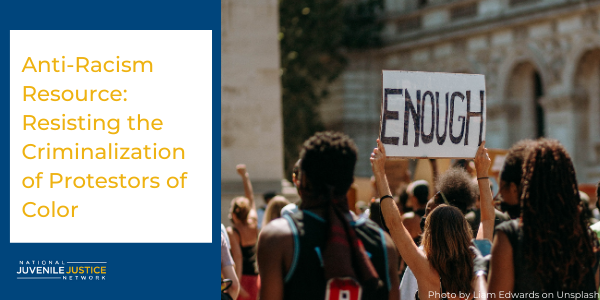
Waves of protests across the country addressing issues ranging from unjust policing to Indigenous land rights have sparked legislation to severely restrict the rights of protestors. These anti-protest laws include measures to criminalize protest actions like blocking streets or camping outside of state capitols; such actions are associated with protests led largely by communities of color like the 2017 Standing Rock protests against the Dakota Access Pipeline and Black Lives Matter demonstrations. In 2017, the American Legislative Exchange (ALEC), developed a “model” bill to increase criminal penalties for protests related to “critical infrastructure” such as water treatment facilities and oil and gas sites. According to the protest law tracker maintained by the International Center for Not-for-Profit Law (ICNL), 43 states have considered 172 bills aimed at restricting the rights of peaceful assembly. Of those, 26 have been enacted and 40 are pending.
Legal scholars and advocates working to push back on anti-protest laws point out that efforts to criminalize activities related to protesting are redundant. For example, the ACLU, which files lawsuits to protect protestors, notes that laws already exist to prosecute individuals for intentionally obstructing cars or pedestrians and trespassing. Efforts to create harsher consequences for actives already deemed illegal are meant to scare people from exercising their constitutional right to protest.
Anti-protest legislation has also, surprisingly, been aimed at certain kinds of demonstrations – namely those led by people of color. Pen America – a membership organization of writing professionals that works to protect free expression in the United States and worldwide - recently published a report, “Arresting Dissent: Legislative Restrictions on the Right to Protest.” The report notes the clear discrepancy in the type of protests that lawmakers are aiming anti-protest laws towards. The report concludes:
“…there is reason to be concerned about the state of those rights. The slate of anti-protest bills analyzed in this report are unnecessary, overbroad, and in many cases, aimed at deterring specific protest movements. ‘These bills appear to be a direct reaction from politicians and corporations to some of the most effective tactics of those speaking out today, including water protectors challenging pipeline construction, [and] Black Lives Matter,’ explained First Amendment attorney Vera Eidelman at the ACLU. ‘These legislative moves are aimed at suppressing dissent and undercutting marginalized and over-policed groups voicing concerns that disrupt current power dynamics.’”
Similarly, Elly Page, legal advisor at ICNL, which tracks anti-protest laws, recently told The Appeal:
“Laws like these have historically been used to penalize communities of color and communities with unpopular views…rioting charges were used widely last summer to target Black Lives Matter protesters, and that’s the big fear—that that’s how those tools would be used if they’re enacted.”
Indeed, some of the anti-protest legislation proposed within the past year would actually increase protection to those who would harm protestors in an alleged act of self-defense. The aim to criminalize communities of color for protesting unjust laws - while protecting those who would harm them - has serious implications for advocates working to transform youth justice policy. It is important we find ways to pushback on legislation that would criminalize community organizers, especially young people, employing protest tactics in order to advocate for major youth justice policy changes.
We hope the following resources provide a starting point to help you monitor anti-protest legislation and strategize ways to resist these efforts in collaboration with other social justice organizers working in your states.
National Overview
- "Republican Lawmakers are Using the Capitol Riot to Fuel Anti-BLM Backlash," The Appeal. January 19, 2021.
- “Arresting Dissent: Legislative Restrictions on the Right to Protest.” Pen America. May 2020.
- "Pipeline Opponents Strike Back Against Anti-Protest Laws," The Intercept. May 23, 2019
- "Conservative-led Anti-Protest Legislation Already Doubled Since Last Year," National Lawyers Guild. February 15, 2018.
- “Where Protests Flourish, Anti-Protest Bills Follow,” ACLU. February 17, 2017.
State Articles [Not Exhaustive]:
MN:
"Recent State Legislation Seeks to Limit Disruptive Protests," Minnesota Law Review. March 23, 2017
FL:
"'Stand your ground" in Florida could be expanded under DeSantis 'anti-mob' proposal," November 20, 2020.
"Amid Capitol chaos, Florida lawmakers file bill to crack down on protests," January 7, 2021.
TN:
"Lee signs protest bill into law despite pushback over increased penalty for camping," Nashville Tennessean. August 21, 2020.
OH:
"'Anti-Protest' Bill Passes Ohio House," The Allegheny front. December 18, 2020.
UT:
"Anti-protest bill wins Utah Senate OK," The Salt Lake Tribune. March 5, 2020.
WI:
"Wisconsin’s Democratic Governor Signs Anti-Protest Bill into Law," The Progressive. November 26, 2019.
Tracking Sites
ALEC’s “Model” Anti-Protest Legislation (Language to recognize in anti-protest legislation)
Critical Infrastructure Protection Act - American Legislative Exchange Council

